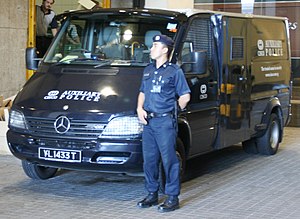Auxiliary police

Auxiliary police are the part-time reserves of a regular police force. They may be armed or unarmed. They may be unpaid volunteers or paid members of the police service with which they are affiliated.
In some jurisdictions, auxiliary police have police powers only during an emergency. During regular operations they may be trained to carry out their duties with powers of citizen's arrest—the same power as any other civilian.
Malaysia
In Malaysia, auxiliary police refers to sworn security police officers serving in autonomous government agencies such as the Malaysian Federal Reserve Bank (Bank Negara), the National Anti-Drug Agency (Agensi Anti-Dadah Kebangsaan - AADK), the Federal Land Development Agency (FELDA) and the Inland Revenue Board (Lembaga Hasil Dalam Negeri); and other institutions with semi-governmental interests. Such institutions include the National Savings Bank (Bank Simpanan Nasional - BSN), Malayan Railways Limited (Keretapi Tanah Melayu Berhad - KTMB), Pos Malaysia Holdings Berhad (the national postal service), Malaysia Airports Holdings Berhad (the largest Malaysian airport operator), the North-South Highway Project (Projek Lebuhraya Utara Selatan - PLUS) and other similar strategic organizations.
Most of these organizations have already been privatized but are allowed to maintain an auxiliary police unit. Under special circumstances, auxiliary police units have also been established by private companies with no government interests at all such as the force maintained by Resorts World Berhad (RWB), the company that operates the popular resort and casino at Genting Highlands.
They are not attached per se to the Royal Malaysian Police, but are granted some police powers such as the power to carry out minor investigations or to make arrests within their area of jurisdiction. Some forces are also conferred the authority to issue traffic summonses (that are paid to the Federal Government, not the issuing organization) for offences committed on their area of jurisdiction. While Malaysian auxiliary police officers are empowered to carry firearms, for this purpose they are subject to the same application and approval procedures as any other private company instead of being treated as part of the Royal Malaysian Police.
Malaysian auxiliary police uniforms have been traditionally different from those of the regular police, but a consolidation exercise by the Management Department of the Royal Malaysian Police Federal Headquarters (Bukit Aman) in 2004 has since authorised the use of regular police dress, insignia and other paraphernalia for sworn auxiliary police officers. The only differences are the unit patches (worn by auxiliary police officers only, sewn on the left sleeve), the shoulder title (which says "Polis Bantuan" or Auxiliary Police, instead of "Polis Diraja" or Royal Police) and the service number (worn by junior police officers of Sergeant Major rank and below, just above the right breast pocket; auxiliary police numbers begin with the letters 'PB' whereas regular officers numbers do not contain any letters.)
Under Malaysian law, auxiliary police officers are obliged to serve voluntarily and are therefore not paid by the Government. As such, they are designated full-time employees of the departments or corporations they serve and are remunerated on a different scale than regular police officers.
Under the Police Act of 1967 (Revised 1988) (Act 344), the Inspector-General of Police, with the consent of the Minister in charge of police affairs and the King, may appoint any person to hold honorary auxiliary police ranks to the level of Superintendent of Police and below, and to establish their areas of jurisdiction.
Singapore
In Singapore, auxiliary police refers to private companies accorded the right to offer armed or unarmed security services to paying clients (as opposed to regular security companies, which offer unarmed services only), which may be governmental or private companies, organisations, or individuals. These armed auxiliary police officers are full-time paid employees of their respective companies, and are not directly affiliated to the Singapore Police Force, although they do take training courses provided by the Singapore Police Force in collaboration with the security companies, and have the privilege of using some recreational facilities and other facilities provided for regular officers.
United States
New York City
The New York City Police Department Auxiliary Police is a division of the Patrol Services Bureau. It comprises unpaid and unarmed volunteers who primarily patrol via foot, car and bicycle to assist as the "eyes and ears" of the NYPD, reporting crimes to central dispatchers, who then relay the information to NYPD police officers.
Hazlet Township, New Jersey
In time of emergency or disaster, Hazlet Township, New Jersey maintains an active volunteer, highly trained and certified Auxiliary police unit that assist the regular Township police force in time of need. Activities on a weekly basis include community policing under the direction of the township's police department and traffic control at emergency situations, fires, car accidents and searches. Also the bike patrol covers Natco Park, Veteran's Park and The Henry Hudson Trail.
Existing auxiliary police units
- Los Angeles County Sheriff's Department Reserves, Los Angeles
- Aetos Security Management Private Limited, Singapore
- CISCO Security Private Limited, Singapore
- Hong Kong Auxiliary Police Force
- SATS Security Services, Singapore
- Residence Hall Security Unit, The Pennsylvania State University
- Special Constabulary, British police forces
- New York City Police Department Auxiliary Police
- Police Service of Northern Ireland Reserve
- Toronto Police Auxiliary
- Winthrop Auxiliary Police Department
- Walnut Creek, California Police Reserves
- Chesterfield County Virginia Auxiliary Police
Historical auxiliary police units
- Royal Ulster Constabulary Reserve
- Ulster Special Constabulary
- Black and Tans, Ireland
- Auxiliary Division, Ireland
